English
Venezuela: El Libertario warns of possible sentence to the 14 SIDOR workers
El Libertario, Śro, 2009-04-29 16:03 English | Represje | Ruch anarchistyczny | Tacy są politycy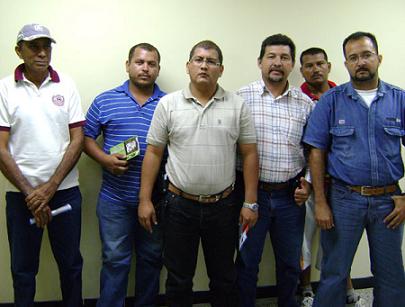
In 05 September 2006 a group of workers and union leaders staged a protest against the carrier Camila, a contractor to SIDOR (Siderurgic of the Orinoco), the principal steel core business located in Puerto Ordaz, Bolivar state, in Venezuela. The workers were protesting the failure to pay wages, and maintain health and safety, as well as the lack of tools to accomplish their work. The protest was endorsed by Readers of the “Sindicato Único de Trabajadores Siderúrgicos y Similares" (Sutiss, the SIDOR`s union), stopping the equipment whose breakdowns and lack of maintenance represented a threat to the integrity of the workers, following the safety procedures in the labor standards. The employers turned to the regional authorities, getting the Public Ministry to issue an arrest warrant against three syndical leaders and a group of workers by the National Guard, which resulted in a protest by workers of the steel mill.
Nurses Fired for Strike
Akai47, Wto, 2009-04-21 07:24 English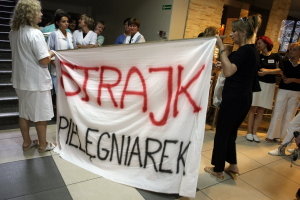 The Director of the Balicki Hospital in Lodz has fired four nurses and union leaders who participating in a strike last Septmber. The strike lasted 11 days. Nurses were demanding pay raises to brings their salaries up to 2000 - 3500 zloties per month (450 -800 euro) depending on position and seniority. At the time the strike began, the director of the hospital, Piotr Kuna, filed a letter with the prosecutor's office claiming that the strike was illegal.
The Director of the Balicki Hospital in Lodz has fired four nurses and union leaders who participating in a strike last Septmber. The strike lasted 11 days. Nurses were demanding pay raises to brings their salaries up to 2000 - 3500 zloties per month (450 -800 euro) depending on position and seniority. At the time the strike began, the director of the hospital, Piotr Kuna, filed a letter with the prosecutor's office claiming that the strike was illegal.
Such letters are to be expected nowadays in most strike situations in Poland. Bosses look for any infraction of the Act on Collective Bargaining to claim a strike is illegal. In addition, more and more workplaces are brining civil suits against workers who took part in strikes. Kuna also threatened to sue the union, the All-Poland Union of Nurses and Midwives, for "damages" incurred during the strike. He claimed that he wanted to get this money and give it to the nurses who didn't strike.
Tenants' Protest Against Rent Increases
Akai47, Pon, 2009-04-20 23:06 English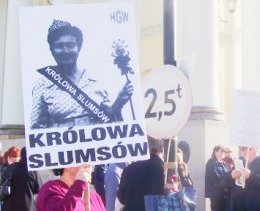 On April 20, tenants from all over Warsaw protested in front of City Hall against dramatic rent increases. The increases, which come into effect as of May 1, will raise rents in municipal housing, often as high as 200-300%. The increases will effect over 100,000 families in Warsaw which live in public housing.
On April 20, tenants from all over Warsaw protested in front of City Hall against dramatic rent increases. The increases, which come into effect as of May 1, will raise rents in municipal housing, often as high as 200-300%. The increases will effect over 100,000 families in Warsaw which live in public housing.
Tenant protests have been going on frequently over the last two months in this city. Some tenants are protesting against the reprivatization of public housing. In many cases, heirs of pre-war owners of property or other claimants have be awarded ownership of buildings with tenants, many who have live their all their lives. Many of these new owners begin to engage in typical slumlord behaviour, raising rents to extreme levels, cutting off heat and water to the tenants and trying to evict them. In the Prague district alone there are over 200 claims to such buildings and 40 buildings have been privatized. In a response to protests in Praga, the city proudly announced it is "doing something" by building new public housing - 39 new flats in Praga North. In the meanwhile, over 700 families are already waiting for housing and, as reprivatization is increasing, this number is growing rapidly.
Demonstration in For Warsaw Squat
Akai47, Sob, 2009-04-18 12:12 English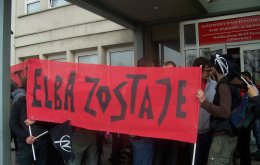 April 17 there was a demonstration in support of the Warsaw squat Elba. The company that owns the building, Stora Enso recycling, wants to destroy the buildings and eventually sell the land.
April 17 there was a demonstration in support of the Warsaw squat Elba. The company that owns the building, Stora Enso recycling, wants to destroy the buildings and eventually sell the land.
The squatters are trying to nicely convince them not to do this, but what do companies like this care?
The Elba squat has existed about 5 years. It started out on one side of the street where there were several buildings but the owner tore all of them except one down - so the squat moved across the street in 2006. They have a fresshop, bicycle workshop, space for meetings and concerts.living space and a wagonburg.
Refugees Protest in Warsaw
Akai47, Czw, 2009-04-16 18:18 English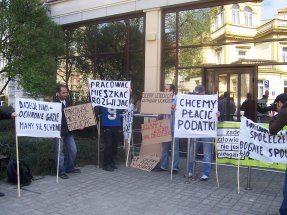 Today about 20 refugees, all from Chechnya, and about a dozen supporters protested in front of the Office for Foreigners in Warsaw. The refugees wanted to protest about the bad conditions in the refugee centers and a general lack of programs to help them integrate.
Today about 20 refugees, all from Chechnya, and about a dozen supporters protested in front of the Office for Foreigners in Warsaw. The refugees wanted to protest about the bad conditions in the refugee centers and a general lack of programs to help them integrate.
They held banners with slogans about the right to work legally, about the health and integration of refugees and the benefits of a multicultural society. In front of the Office for Foreigners they read a petition with their postulates and spoke about their problems. On of the main problems is financial - the refugees are not allowed to work while applying for status and they receive only 70 zloties a month pocket money - which is less than 18 euro.
People working with the refugees stressed that still too few people are given legal status in Poland. Last year over 8500 people applied for refugee status, mostly Chechens. The Office for Foreigners granted status to only 186 people.
After picketing at the Office for Foreigners, people marched to the Prime Minister's office to give him a letter and petition.
Below are some photos. (Press czytaj dalej).
Abolishing the Borders from Below #34 is out
Czytelnik CIA, Śro, 2009-04-08 23:34 EnglishAbolishing the Borders from Below #34, anarchist journal from Eastern Europe, is out. March'2009 edition of this excitingly irregular anarchist magazine has 64 pages, following slogan on the cover “Turning point is here – lets turn crises into system collapse!” and includes following materials:
-“These shards are our tears” – we wont forget you Stas and Nastya;
-Students on the streets of Chisinau after 29 years old student was shot dead by Moldavian police;
-Czechoslovak anarchist Federation in 2008 report;
-“Towards an education for freedom” text from Russia;
-“20 years after the round table” – a brief look at capitalism in Poland;
-“Instead of proletarian struggles” – text by Barricade Collective;
-“What causes the economic crisis” – crisis from polish anarchist perspective;
-Renaissance of squatting movement in Czechia
-“Dept-strike as one of possible answers to he crisis” – text from Hungary;
-Interview with Black Flag Rec. on anarchist movement in city of Lodz;
-Minsk Zine-Fest from a slightly other point of view;
-Workers Initiative under attack from employers and state - Poland;
-Workers in Ukraine seize their plant – various reports and statements;
-Platform minimum of Czechoslovak Anarchist Federation;
-Reports from solidarity actions with “Greek-Revolt” around Eastern Europe;
-Rozbrat – a free space in an unfree world – report on situation in Poznan;
-Report from protests against NATO-summit in Krakow (Poland);
-“Russian prisons are amongst the most rebellious in the world” - on prison resistance in Russia;
-“All governments are the same scum!” – report from March 8 demo in Warsaw;
-Unknown moments of East European anarchist history – anarchist groups in Lodz (Poland) 1905-1939;
-“The case of the Janov neighbourhood” – antifascist report from Czechia;
-Antifascist action Budapest – Day of Honour report;
-“No repression for standing up to fascism” – polish state protects fascists and anti-semites;
-Interview with Russian anti-racists;
-... and many more information, announcements and contacts;
Venezuela: The People’s Struggle is the Best Response to the Crisis!
El Libertario, Śro, 2009-04-08 18:15 English | Ruch anarchistyczny | Tacy są politycy* Soon El Libertario #56 will be available in the street and on the Internet (www.nodo50.org/ellibertario). El Libertario is the voice of free ideas and independent social movements in Venezuela and Latin America. As a preview of its usual combative, irreverent and uncompromising position with regard to authoritarian power and oppression, here's the editorial:
All thorough media analysts agree about the increased vulnerability of the Venezuelan economy to the consequences of the world economic crisis. The question is obvious: how could our country be one of the most affected by the pressures of the global capitalist system if it has been claiming to build its so-called "21st-century socialism" for a decade? The answer is simple: because, contrary to speeches and shows, it has not gone in any direction different from the economic globalization that has prevailed in the last two decades on the planet.
Cuba: The hurt of no longer being
El Libertario, Wto, 2009-04-07 22:37 English* Fragment from a work by Daniel Barret about the evolution of Cuba’s political regime since November 17 2005 till today. This piece attempts to place the role of Fidel Castro these past months.
Talking about a political regime so dependent on its tribal totem pole, it is not surprising that a fundamental chapter of its trajectory is about Fidel Castro; “commander in chief” by his own guerrilla merits and per saecula saeculorum. Fidel seemed to be dead but not buried back on January 11 2009 and very few dared to speak of missing him too much. By then he had already stopped his Reflexiones for some time and didn’t show much interest in appearing in person during visits by foreign leaders such as Rafael Correa of Ecuador and Martín Torrijos of Panama. Crowning the situation that very same day, in one of his periodic medical reports, a visibly moved Hugo Chávez said the following: “We know that the Fidel that walked streets and villages with his warrior image, in his uniform, hugging people, will not come back”. To finish by saying: “He will remain in our remembrances, because Fidel will live on, as he is alive today, and will live forever, past the physical life. And he must live – he knows it- many years”. That seemed like a poetic epitaph, the product of Hugo Chávez’s proverbial incontinence, who perhaps could not help offering the world such delicacies. But what Chávez probably didn’t take into account at that moment was the decision by the Cuban political rulers regarding the immortality of its icon and thus had to backtrack suddenly and announce amid drum rolls that Fidel was “very much alive”.
Police Arrest Anti-Xenophobia Activists
Czytelnik CIA, Śro, 2009-04-01 18:19 EnglishThe 15-day Xenophobii.NET (No to Xenophobia) Campaign ended in arrests,
when viewers leaving a film screening at Rodina film theater in the
center of St. Petersburg were dispersed by the police on Sunday. But
while the Russian media, from RTR television to Fontanka.ru news portal,
reported a mass fight between Antifa activists and neo-Nazis, both the
police and detained film-goers deny any fight took place.
“There was no fight, it was prevented,” police spokesman Vyacheslav
Stepchenko said by phone on Monday.
“It seems to be a provocation; the Antifa activists and neo-Nazis never
came into contact,” an anti-Nazi activist who only gave his first name,
Denis, said by phone on Monday.
Groen Flex and Eurocontract Zeeland, a misty clutter
Czytelnik CIA, Wto, 2009-03-31 19:58 EnglishFrom the Solidariteit webzine of the Anarchistische Groep Amsterdam/de Vrije Bond which acted in the case.
Polish temp worker fights back [1]
On the 12th of December 2008 Michal signed a contract with the temporary employment agency Groen Flex in the Polish city Opole. Groen Flex would send him to work with Eurocontract Zeeland in the Netherlands. The contract applied for a period 78 weeks and they told Michal he would work in glasshouses with vegetables. The contract, signed in both Poland and the Netherlands, guaranteed health insurance starting December 15th 2008. This ‘guarantee’ became the point of difference between Michal and his union on the one hand and Groen Flex on the other.
On his first workday, the 15th of December, he was send to work at the Koninklijke Schelde in Vlissingen, a shipyard! He started working, even though he never did such work, didn’t get any (safety) instructions, and not being able to speak Dutch nor English he couldn’t read one warning sign. Just like many others before and after him, Michal came to the Netherlands to make money. First of all because it’s a lot harder to find a job in Poland and second of all because the wages are much lower. Out of fear to lose their jobs with the employer (Groen Flex) and the principal (the shipyard), when just arrived to the Netherlands, a lot of workers don’t regard their own safety.
A) Book & Video Fair of Caracas
El Libertario, Wto, 2009-03-31 08:54 English-2_0.JPG)
The editorial collective of El Libertario
announce that the Venezuelan capital will be, during the second half of
November 2009, the venue for D O C U M E N T (a) , the First Libertarian
Print and Audiovisual Documentary Fair.
With this event, we want to show the public a sample as large and
representative as possible of printed and audiovisual materials produced
and avaliable today about the anarchist ideal and related subjects,
because as in many others places, in Venezuela it is usually difficult to
access to books, periodical publications or other documents about anarchy,
thus making it more difficult to overcome ignorance and misunderstanding
regarding this idea and practice.
Haitian yellow unions are giving legitimacy to the unscrupulous Haitian dominant classes. CTH is one example.
Czytelnik CIA, Pon, 2009-03-30 18:51 EnglishTHE BATTLE FOR THE MINIMUM WAGE ADJUSTMENT AND WAGE HIKE IN HAITI
In every social formation, the working class faces the daily ruthless exploitation and domination of the capitalist class. Other classes in capitalist society or capitalist dominated society also face the wrath of bourgeois domination but the working class is one of the classes that deals both with domination and exploitation, giving the working class an historical role in bringing humanity to a much higher form of social relations based on a classless society. This special relation of the workers to capital allows the working class movement to combat the petit bourgeois interpretation of bourgeois democracy.
PKP Cargo Fires and Spends
Akai47, Pią, 2009-03-27 20:32 EnglishPKP Cargo is a freight cargo company. PKP was the name of the state railways in Poland and it was divided into separate companies. PKP Cargo was created in 2000. The PKP Cargo company owns a minute share of the stocks (less than 3%) while the state treasury owns the rest. PKP Cargo in turn owns a majority or total share in 20 other companies, most of which are also freight companies. In is a very intricate and confusing financial web.
All of the companies around the rail industry are under constant pressure to make cuts; this was in fact part of IMF-recommended policies for Poland and other Eastern European states. With the crisis, PKP Cargo in particular wanted to cut a lot of jobs. Job loss in PKP Cargo may wind up being the biggest hit to any group of workers in Poland: different figures have been mentioned with many saying that up to 7,300 jobs will be lost. (One source, Gazeta Prawna (or the Legal Newspaper) even puts this estimate at 9,500 jobs.)
Support the workers of Babylon Cinema in Berlin!
Akai47, Czw, 2009-03-26 18:16 English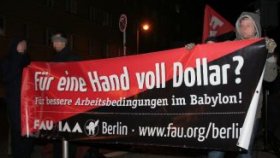 On March 11, Benoit Robin, a projectionist at Babylon Cinema in Berlin and an activist of FAU, was fired from his job. He was in the midst of organizing for improved working conditions in the cinema.
On March 11, Benoit Robin, a projectionist at Babylon Cinema in Berlin and an activist of FAU, was fired from his job. He was in the midst of organizing for improved working conditions in the cinema.
In January a FAU group was organized at the cinema. The workers there have poor wages: from 5.5-6 euro per hour, 6.4 euro for projectionists. This is a very poor wage in the industry. Many of the workers are precarious and have no contracts. They have no paid holiday or other benefits. By comparison, workers in another cinema chain receive 8.5 euro per hour plus 30 pays paid vacation.
Call for Summer of Resistance 2009
Czytelnik CIA, Śro, 2009-03-25 13:21 EnglishCollapse the security architectures!
Against NATO, G20, G8, Frontex and the “Stockholm Programme”!
Since the end of the last millennium a modification of the “security architecture” within the EU takes place, which have been accelerated by the attacks of 11 September 2001 in the United States. Visible phenomena are for example the entanglement of internal and external security, a “pooling” of prosecution authorities and intelligence sevices and a simplified data exchange.
At the technical level we are confronted with new digital surveillance cameras, satellite surveillance, biometrics, drones, software for intelligent search in databases and new broadband networks to manage this huge flood of digital data.
New institutions and authorities have been created, including the “European Police Office Europol, the police academy CEPOL, the border agency Frontex and the” Committee for the Management of Operational Cooperation " of all police agencies of the EU within its intelligence operation assessment center.







